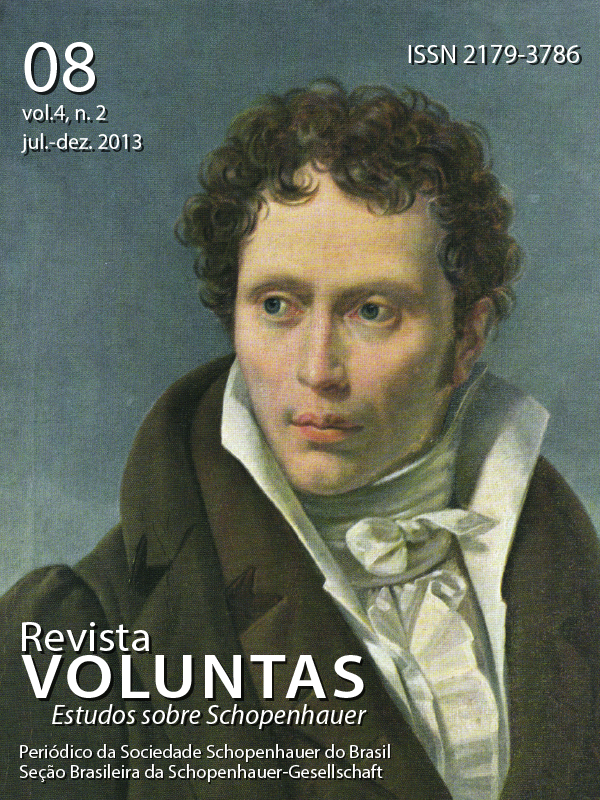Akrasia and the errancy of the will in Schopenhauer
DOI:
https://doi.org/10.5902/2179378633959Keywords:
Will, Discontinuity, FantasyAbstract
Starting from that which Schopenhauer considers the assumption of all ethics, the inner meaning of the world, i.e., the upon human action prevailing diversity between the inner causality and the materiality of the world, this article firstly treats Schopenhauer’s critique on Kant’s philosophy, in which Schopenhauer affirms that Kant has contributed to philosophy above all the discontinuity between the ideal and the real, by substituting the belief in the power of the intellect by the notion of fantasy and including the factor of subjectivity among the causes of mood swings. Secondly, it discusses the world as will opposed the world of subjectivity.Here the tragic comic story of the world unfolds, because the will does not move towards an object justifying the world’s wear, proportionally rewarding the efforts that are made or guarantying the expected satisfaction.Downloads
References
ARISTÓTELES. Ética a Nicômaco. Trad. publicada sob licença da Editora Universidade de Brasília. São Paulo: Nova Cultural (Os Pensadores), 1996.
BRUM, José Thomaz. O pessimismo e suas vontades: Schopenhauer e Nietzsche. Rio de Janeiro: Rocco, 1998.
NIETZSCHE, Friedrich. Crepúsculo dos Ídolos ou como se filosofa com o martelo. Trad. de Paulo César de Souza. São Paulo: Companhia das Letras, 2006.
SCHOPENHAUER, Arthur. Critique de la philosophie kantienne. Traduit en français par A. Burdeau. Paris: PUF, 2006.
SCHOPENHAUER, Arthur. Le monde comme volonté et comme représentation. Traduit en français par A. Burdeau. Paris: PUF, 2006.
SCHOPENHAUER, Arthur. Parerga e Paralipomena. Tradução de Wolfgang Leo Maar e Maria Lúcia Mello e Oliveira Cacciola. São Paulo: Nova Cultural (Os Pensadores), 1988.
Downloads
Published
How to Cite
Issue
Section
License
The submission of original manuscripts to this journal implies the transference, by the authors, of the copyrights for printed and digital publication. The copyrights of a published manuscript belong ultimately to the author, and only the copyright for its first publication is reserved to the journal. Authors may only use the same results in other publications explicitly indicating this journal as the medium of the original publication.
Licence
Attribution-NonCommercial-ShareAlike 4.0 International (CC BY-NC-SA 4.0) - This license lets others remix, tweak, and build upon your work non-commercially, as long as they credit you and license their new creations under the identical terms.






